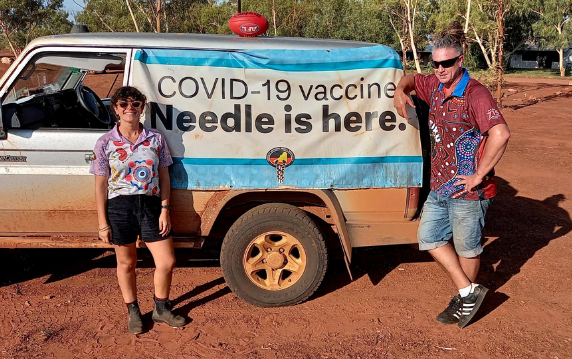Since last year, WA Primary Health Alliance has worked with partners around the State to accelerate vaccination efforts within populations that may be more vulnerable to the effects of COVID-19.
Funding was allocated to organisations committed to increasing vaccination rates within Aboriginal populations, culturally and linguistically diverse populations, and people living in regional areas.
Last year, social inequities in WA resulted in disproportionate vaccination rates in the community.
Some suburbs of Perth had 90 per cent double dose vaccination rates, while some remote communities had people who hadn’t even received a first dose.
WAPHA’s role in driving vaccination rates was a supportive one, with a focus on finding local solutions to local challenges and building on existing relationships with health care providers, commissioned services, and non-government organisations.
More than $533,000 in funding was distributed to organisations around the State from Balgo (3000km north of Perth) down to Esperance in the south.
The day Rowena Brown from Port Hedland received her first vaccine was a celebrated achievement.
Ms Brown had been too scared to receive the vaccine after hearing horror stories and misinformation.
After a GP took time to reassure and provide further information, Ms Brown had the confidence to receive her vaccine and her daughter and niece followed her lead.
A footy carnival and vaxathon in Balgo was also seen as a success when dozens received COVID-19 vaccinations.
While that number might seem insignificant, as seen with Rowena – one person receiving the vaccine can have a ripple effect in regional communities.
The vaccine drive saw already hard-working metropolitan and country GPs step up to support vulnerable patients and their communities.
Many worked outside of traditional business models and received funding to:
- Run walk-in clinics
- Conduct after hours clinics in the evenings and weekends
- Administer door-to-door vaccinations
- Hold yarning circles and other culturally appropriate activities to provide vaccine education.
The team at WAPHA worked with more than 35 non-traditional partners from mining, the public sector, Aboriginal Community Controlled Health Services, consumer and sporting groups to drive vaccination rates.
Going forward the team will continue to work with these partners and to make new connections to continue to drive first dose, booster and winter doses among populations vulnerable to COVID-19 with a particular focus on rough sleepers before winter.

